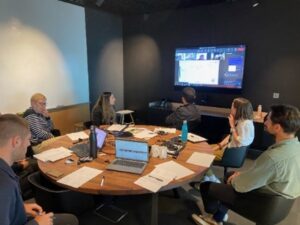Following the introduction of our Gate One Start-Up, we left you with two brilliant sustainable business ideas for our team to vote for (if you haven’t read the first blog post on our start-up with 250 founders, we recommend you take a look here before continuing!). With 68% of the total votes, the winner was…
Dirty Nappy!
We also had 36 people expressing interest in helping get the business off the ground – it was fantastic to have ~15% of the company wanting to take an active involvement! We knew individual involvement would always work around client and personal commitments, so we committed to getting as many people into some sort of active role during the project’s lifespan, no matter how light touch.
By sharing frequent communications and light touch opportunities, the door is always open if someone else in Gate One wants to get involved.
So, what have we been up to?
We kicked things off with a brainstorm – coming up with alternative business model and last mile pick-up ideas.
Although we had done preliminary research into the idea and assessed feasibility, there were still unanswered questions that we needed to answer.

The story of Dirty Nappy…
The problem: Three billion disposable nappies are thrown away every year in the UK (equal to eight 8 million a day!).
That is a staggering number, with estimates being that the average baby gets through 5,000 nappies before reaching their potty-trained years.
Our solution: A nappy subscription and pick up service, where nappies are recycled via a third party.
With 620,000 new parents every year, and with sustainability being top of mind for so many, recycling used nappies would appeal to parents wanting to be more sustainable but who didn’t want the inconvenience of using reusable nappies.
We found that only 6% of parents we surveyed currently used reusable nappies, citing numerous issues with them, and despite a number of reusable nappy schemes already being promoted by local government. This meant an alternative sustainable solution was needed.
But what about compostable nappies?
Our thoughts exactly – and we did explore this route in detail. Unfortunately, compostables were a dead-end. While there are several nappies that say they are compostable, there aren’t actually any facilities in the UK that will compost them! These ‘compostable’ nappies ultimately end up in the same place as every other nappy. If you’re interested – there are some great organisations doing work in this area trying to push the government for regulatory change, including Laura Crawford, the founder and CEO of Mama Bamboo, who shared her thoughts with us as part of our research.
We also found that 77% of parents we surveyed were “very” or “somewhat” concerned with the environmental impact of nappies going to landfill. This told us that not only was a sustainable alternative needed, it was actually wanted by parents. This want would have to be weighed up against other considerations (such as cost and convenience), but it gave us confidence that there was a market for it.

Time for research?
We then had to dig deeper into what it would take to get this idea off the ground. We conducted a variety of research, including:
- Speaking with the head of NappiCycle, a nappy recycling facility in Wales as a potential recycling partner (you read more on what they do here).
- Conducting consumer surveys and interviews to see how much (and if at all) people were willing to pay for this service.
- Speaking with Environmental Service Officers from Camden Council.
- Undertaking research on the waste and recycling landscape in London.
- Completing competitor research on what else had been done in this space and who was also working on solutions. There had been a trial in Bristol with a sustainable nappy brand called Pura that provided some insight into what our potential MVP could look like.
Now what?
- We now need to go away and fully evaluate all of the research to help us answer some of the key questions we set ourselves.
- Is recycling actually better than other options?
- Will enough people want to pay for this service?
- What is a viable business model for collection?
- Do councils want this service/is it viable?
- What do we want to test with our MVP and who can we test it with
Stay tuned to find out how we get on.
Launching a start-up tests creativity, leadership and grit like nothing else. These qualities set our consultants apart from our competitors and directly benefit your business. Find out more about how the Incubator helps us drive innovation.

